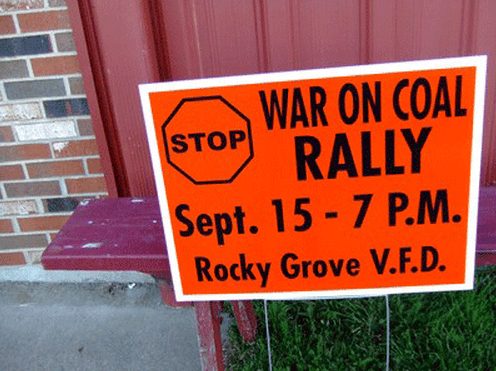Coal country incensed at what it sees as Obama’s overreach on coal regulations
A sign advertises the “Stop The War On Coal” rally in Franklin, Pa. About 100 people attended the rally. (Photo by Ann Murray.)
Concerns about the economy and jobs are driving the election in different ways around the United States. When it come to Appalachia, the environment is right in the middle of the debate, thanks to the area’s dependance on coal.
Coal, which is mined across Appalachia, faces a slew of new regulations from the Obama Administration. In states like Pennsylvania, West Virginia and Virginia, there are billboards, rallies and ads blaming Obama as coal plants and mines shut down and new projects are stalled.
But the reality seems to be a bit murkier — a bit less about Obama and a bit more about, well, the economy.
Carol Mulrey says President Barack Obama is waging a war on her coal-dependent community and he has to go. She organized a political rally with six of her friends at Rocky Grove Fire Hall in Franklin, Pa.
“The current administration is putting coal, through the EPA, out of business,” she said.
Mulrey is specifically worried about Joy Global, one of the biggest employers in Venango County, Pa.
“They make underground mining machines and if there are no mines, guess what, there are no jobs in our area,” she explained.
Joy Global has already laid off 200 people because of the slow economy. Alpha Natural Resources recently announced it would close mines in Pennsylvania, West Virginia and Virginia and cut more than a thousand jobs companywide. Mulrey thinks new EPA pollution standards unfairly target mining operations and coal-fired power plants and more jobs will be lost.
But many U.S. power companies have long planned to close some aging, inefficient plants. The US Energy Information Administration says one in 10 coal-fired plants will shut down in the next few years, but Allen Beamon, energy analyst with the EIA, cautions that plants close for complicated reasons.
“You’re not just looking at any single factor,” he said. “There’s no single straw that broke the camel’s back. You’re looking at coal prices, you’re looking at electricity demand growth, you’re looking at natural gas prices.”
Electricity demand in many parts of the country is the lowest it’s been in decades. And in the last four or five years, low natural gas prices , depressed by an abundance of shale gas, have upended energy market.
“Coal power plants have accounted for nearly half or slightly more than half of the generation in this country. They were the work horses of the fleet. But the economics have changed now with gas prices as low as they are today,” Beamon said.
Across the hall from Mulrey, Gary Dubois, a longtime mining engineer, is selling lawn signs that say “stop the war on coal.” He says the EPA has overstepped its bounds.
“We have administrators, non-elected officials completely bypassing what our elected officials do and that’s to make laws,” he said.
Dubois says sales of his anti-Obama signs and T-shirts, indicate the frustration of coal communities. Some of the biggest names in the coal industry are financing aggressive efforts to defeat Obama. The American Coalition for Clean Coal Electricity has spent about $12 million on pro-coal TV ads.
Although the United Mine Workers of America rejects the “war on coal” language, the union, which backed Obama in 2008, remains uncommitted this year, said Dan Kane, UMW’s International Secretary-Treasurer.
“We have not made an endorsement. It’s primarily because of the regulations and the activities of the EPA. We can’t mine coal if there’s no place to burn it,” he said.
The EPA, unsurprisingly, disagrees, with the criticism.
“Coal is still expected to generate more of America’s electricity than any other fuel source. However, market conditions in the power sector are driving business decisions that are completely independent from these long-overdue pollution standards,” the agency said in a statement.
The union estimates the EPA’s mercury rule, which goes into effect in 2015, will put a quarter of a million coal and coal-related jobs “at risk” because they say it will be too expensive to retrofit older power plants. Kane also estimates that new coal-fired power plants will be virtually impossible to build.
For the first time ever, gas and coal are neck and neck as the fuel of choice for electricity generation. The EPA says economic factors like these have changed coal’s position in the energy mix — not malicious intent to target a fossil fuel. But some politicians aren’t willing to let the EPA go any further.
Right before adjourning, Republicans and 17 Democrats in the U.S. House of Representatives aproved a package of bills to reduce the EPA’s regulatory reach.
The White House has threatened to veto the bill if it makes it through Congress. Activists in coal country are hoping that on Nov. 6, they’ll take that veto pen out of Barack Obama’s hands.
We want to hear your feedback so we can keep improving our website, theworld.org. Please fill out this quick survey and let us know your thoughts (your answers will be anonymous). Thanks for your time!
